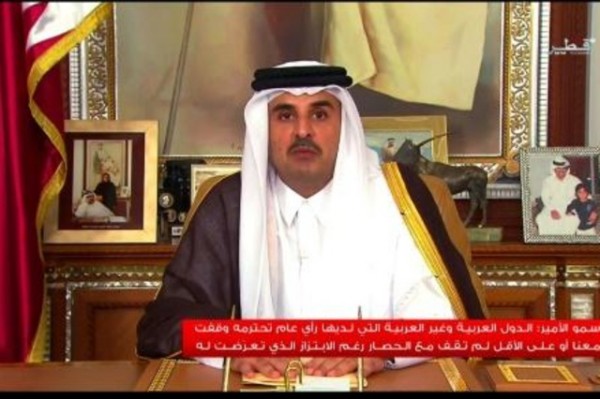Lobelog: Was Emir Tamimís Speech a Turning Point in the Qatar Crisis?

2017-08-11 - 7:56 p
Bahrain Mirror: As Qatar's Emir Sheikh Tamim bin Hamad Al Thani delivered his first speech since the "quartet" (Bahrain, Egypt, Saudi Arabia, and the United Arab Emirates) severed ties with Doha last month, a positive turning point in the Qatar crisis seemed in the offing, reported Giorgio Cafiero in a Lobelog article.
Cafiero explained that first, the quartet shifted its focus from a list of 13 demands to six core principles dealing with the struggle against extremism and terrorism, and second, the emir issued a decree one day before his speech that established new parameters for defining terrorism. "Yet scores of government officials and political commentators in the quartet countries responded quickly and negatively to the emir's speech, rejecting it as a basis for resolving the crisis."
The Qatari monarch had declared in his address that his country was ready for talks aimed at resolving the seven-week-old row, yet would never relinquish its rights as a sovereign and independent country, maintaining that Doha is combatting terrorism and extremism "relentlessly and without compromise," and doing so with the international community's blessing. Emir Tamim also blasted the quartet for waging a "unprecedented smearing campaign" against the emirate.
Ultimately, the conflict boils down to the fact that there still are fundamental disagreements over who is a terrorist in the Middle East and which regional groups and movements are extremist, Cafiero further stated, adding that if Emir Tamim's speech does not precede a new chapter of sincere dialogue and compromise in the Qatar crisis, the long-term prospects for the GCC remaining a six-member institution will dim and disintegration will become an increasingly likely outcome. "The Qataris have proven capable of weathering the economic impact of the quartet's sanctions while securing support from Western powers, Kuwait, Oman, Iran, Turkey, and Asian countries. The current level of pressure on Doha will not likely result in Qatar capitulating."
Should Doha not make changes in its conduct sufficient to secure restored relations with the Saudi/UAE-led bloc, he noted, "a parting of ways," as the UAE's chief diplomat warned last month, may become the next major development in the Qatar crisis.
Concluding his article, Giorgio Cafiero said that Emir Tamim emphasized in his speech, Qatar does not envision a future GCC in which all members have to agree on all issues. "Assuming that Doha refuses to sever its relations with a host of actors that other GCC governments classify as terrorist organizations and Abu Dhabi maintains its staunchly anti-Islamist foreign policy, an ongoing battle of narratives will continue to leave the GCC divided on terrorism, among other issues," wondering: How long can the six members of the GCC continue to function as a bloc given such differences?
- 2022-07-07Israel Reaches Record Trade Increase With Arab States Under Abraham Accords
- 2022-06-10Israeli PM Bennett Visits Abu Dhabi, Meets with UAE President
- 2022-06-10Israelis to be Allowed into Qatar for World Cup, Officials Say
- 2022-06-06Biden should not Visit Saudi, Meet Crown Prince: US Lawmaker Adam Schiff
- 2022-06-01Israel Signs UAE Free Trade Deal, Its First in Arab World